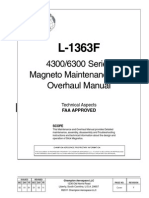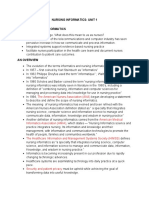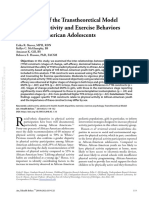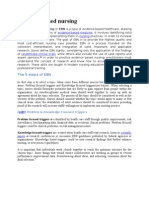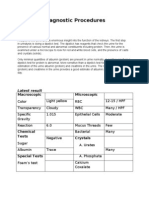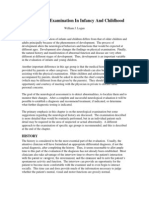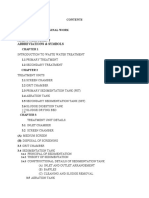Evidence Based Practice
Evidence Based Practice
Uploaded by
Tyler HemsworthCopyright:
Available Formats
Evidence Based Practice
Evidence Based Practice
Uploaded by
Tyler HemsworthOriginal Description:
Copyright
Available Formats
Share this document
Did you find this document useful?
Is this content inappropriate?
Copyright:
Available Formats
Evidence Based Practice
Evidence Based Practice
Uploaded by
Tyler HemsworthCopyright:
Available Formats
Evidence-Based Practice in Nursing
Examine the importance of incorporating current research evidence into clinical decision-making
and discuss the steps involved in implementing evidence-based practice in nursing care.
Evidence-based practice (EBP) in nursing is a systematic approach that integrates the best
available research evidence, clinical expertise, and patient preferences to guide clinical decision-
making and improve patient outcomes. It involves critically appraising and applying research
findings to inform nursing practice, ensuring that interventions and care are based on the most up-
to-date and reliable evidence. Here is a detailed explanation of evidence-based practice in nursing:
1. Importance of Evidence-Based Practice:
• Enhancing Patient Outcomes: By incorporating current research evidence into
clinical decision-making, nurses can provide care that is more effective, safe, and
aligned with best practices, leading to improved patient outcomes.
• Ensuring Quality and Safety: Evidence-based practice promotes the use of
interventions and procedures that have been shown to be safe and effective through
rigorous research. This reduces the risk of harm to patients and enhances the overall
quality and safety of nursing care.
• Advancing Professional Development: Engaging in evidence-based practice
encourages nurses to stay updated with the latest research findings, enhancing their
knowledge and professional growth. It also fosters a culture of lifelong learning
within the nursing profession.
2. Steps in Implementing Evidence-Based Practice:
• Formulating a Clinical Question: The first step in evidence-based practice is
formulating a clear and focused clinical question based on the patient's problem or
the nursing intervention under consideration. The question should be structured
using the PICO framework (Population, Intervention, Comparison, Outcome) to
guide the search for relevant evidence.
• Conducting a Literature Search: Once the clinical question is identified, nurses
conduct a systematic search of the literature using databases and other reliable
sources to find relevant research evidence. This includes peer-reviewed journals,
systematic reviews, meta-analyses, and clinical practice guidelines.
• Appraising the Evidence: After identifying relevant research articles, nurses
critically appraise the evidence to evaluate its validity, relevance, and applicability
to the clinical question. This involves assessing the study design, sample size,
methodology, and statistical analysis to determine the quality and strength of the
evidence.
• Synthesizing the Evidence: Nurses analyze and synthesize the findings from
multiple research studies to develop a comprehensive understanding of the
evidence. This includes comparing and contrasting the results, identifying patterns
or consistencies, and determining the overall strength of the evidence.
• Integrating the Evidence: Based on the synthesis of the evidence, nurses integrate
the findings into their clinical decision-making process. They consider the patient's
unique circumstances, preferences, and values, along with their own clinical
expertise, to develop an individualized care plan.
• Evaluating Outcomes: Nurses implement the evidence-based intervention and
closely monitor the patient's response. They collect data on outcomes, evaluate the
effectiveness of the intervention, and make adjustments as necessary. This step
contributes to the ongoing cycle of evidence-based practice, as outcomes are
assessed and used to inform future practice decisions.
3. Barriers and Facilitators of Evidence-Based Practice:
• Barriers: Some common barriers to implementing evidence-based practice in
nursing include time constraints, lack of access to research literature, limited skills
in critically appraising research, resistance to change, and organizational culture
that does not prioritize evidence-based practice.
• Facilitators: Organizations can support evidence-based practice by providing
resources, promoting a culture of inquiry, and offering training and mentorship to
nurses. Collaboration between nurses, researchers, and educators can also facilitate
the integration of research evidence into practice.
4. Ethical Considerations: Nurses must consider ethical principles when implementing
evidence-based practice. This includes obtaining informed consent from patients, ensuring
patient confidentiality, respecting patient autonomy, and considering the potential risks and
benefits of interventions based on the available evidence.
Evidence-based practice is a continuous process that requires ongoing learning, critical thinking,
and integration of research findings into nursing practice. By incorporating
You might also like
- Paint Pigment Solvent Coating Emulsion Formulations BookDocument10 pagesPaint Pigment Solvent Coating Emulsion Formulations BookMuhammad Anwer50% (4)
- Fundamentals of Nursing Pharmacology 1st Canadian Edition 1678215461Document791 pagesFundamentals of Nursing Pharmacology 1st Canadian Edition 1678215461Joseph Levi DuranNo ratings yet
- How To Write A Nursing Care PlanDocument5 pagesHow To Write A Nursing Care PlanTyler HemsworthNo ratings yet
- COG Chemo Admin GuidelinesDocument38 pagesCOG Chemo Admin GuidelinesCristina Georgiana ZahariaNo ratings yet
- Slick Mag Overhaul ManualDocument64 pagesSlick Mag Overhaul Manualleather_nun100% (3)
- Implementation of An SBAR Communication ProgramDocument7 pagesImplementation of An SBAR Communication Programatika indriyadiNo ratings yet
- Lesson 2 - Defining The Research ProblemDocument10 pagesLesson 2 - Defining The Research ProblemMarkNo ratings yet
- Nursing Research Sara Jo Brown Edition Comparison 3 Edition Versus 4th EditionDocument3 pagesNursing Research Sara Jo Brown Edition Comparison 3 Edition Versus 4th Editionynottrip0% (1)
- Overview of Nursing Research ArifDocument37 pagesOverview of Nursing Research ArifKhalil Ahmed JattNo ratings yet
- A Concept Analysis On Patient-Centered Care: BSN 1 - D Submitted To: Mrs. Marianne G. SoteloDocument15 pagesA Concept Analysis On Patient-Centered Care: BSN 1 - D Submitted To: Mrs. Marianne G. SoteloJan Karl PreciosoNo ratings yet
- Nursing Informatics: Unit 1 Introduction To Informatics: The American Nurses Association (ANA)Document3 pagesNursing Informatics: Unit 1 Introduction To Informatics: The American Nurses Association (ANA)Gabbi Kim100% (1)
- Running Head: Scope of Practice Is State Regulated 1Document7 pagesRunning Head: Scope of Practice Is State Regulated 1Carole MweuNo ratings yet
- Sbar Mini Case StudiesDocument2 pagesSbar Mini Case Studiesapi-367705934No ratings yet
- Nursing Competency Standards in Primary Health Care - An IntegrativeDocument13 pagesNursing Competency Standards in Primary Health Care - An Integrativecarlos treichelNo ratings yet
- Nursing Sensitive Indicators Their RoleDocument3 pagesNursing Sensitive Indicators Their RolePuspita Eka Kurnia SariNo ratings yet
- Personal Philosophy of NursingDocument7 pagesPersonal Philosophy of Nursingapi-401205232No ratings yet
- 3 NCM119A Evidence Based Practice Sept. 3 2021Document5 pages3 NCM119A Evidence Based Practice Sept. 3 2021Ghianx Carlox PioquintoxNo ratings yet
- Week 2 InitialDocument2 pagesWeek 2 InitialSara NielsenNo ratings yet
- Study Guide 5: Evidence-Based Practices in Nursing Management Topic OutlineDocument4 pagesStudy Guide 5: Evidence-Based Practices in Nursing Management Topic OutlineElizabeth DaligdigNo ratings yet
- Identifying An Unknown Microorganism IIDocument6 pagesIdentifying An Unknown Microorganism IIMalik RizwanNo ratings yet
- Interpersonal Relations Theory: Hildegard PeplauDocument29 pagesInterpersonal Relations Theory: Hildegard PeplauRenuga SureshNo ratings yet
- jOURNAL THEORY TTMDocument14 pagesjOURNAL THEORY TTMTrihartuty TrihartutyNo ratings yet
- N461 - Final Exam Study Guide - RN-BS - Spring 2017Document7 pagesN461 - Final Exam Study Guide - RN-BS - Spring 2017Jeffrey ViernesNo ratings yet
- A Field Guide To Designing A Health Communication StrategyDocument308 pagesA Field Guide To Designing A Health Communication StrategynonimugoNo ratings yet
- Maternity Nursing Course Outline - Clinical PDFDocument24 pagesMaternity Nursing Course Outline - Clinical PDFAshraf NoriNo ratings yet
- Nur 4242 Practicum Log 1Document2 pagesNur 4242 Practicum Log 1api-447860598No ratings yet
- Sample Assignment of Nursing LeadershipDocument5 pagesSample Assignment of Nursing LeadershipPrasiddha Parajuli100% (1)
- Thesis Proposal FormatDocument23 pagesThesis Proposal FormatJeanilynTanNo ratings yet
- NURS 115 Course Syllabus 201910 DMLDocument41 pagesNURS 115 Course Syllabus 201910 DMLJade BouchardNo ratings yet
- Pediatric Nursing - Fever AnxietyDocument7 pagesPediatric Nursing - Fever AnxietyErvin ArdiansahNo ratings yet
- Learning ObjectivesDocument3 pagesLearning ObjectivesYosep BeNo ratings yet
- Acute Respiratory FailureDocument72 pagesAcute Respiratory Failureraghad awwadNo ratings yet
- Introduction of Nursing ProcessDocument24 pagesIntroduction of Nursing Processainul mardiahNo ratings yet
- 2015 - Nursing Students' Experiences of and Satisfaction With The Clinical Learning EnvironmentDocument12 pages2015 - Nursing Students' Experiences of and Satisfaction With The Clinical Learning EnvironmentDaniel Andres Rincon AlvarezNo ratings yet
- Ways of Knowing in A Clinical CaseDocument8 pagesWays of Knowing in A Clinical CaseAntonioNo ratings yet
- 2 Application of Concept Analysis To Clinical PracticeDocument8 pages2 Application of Concept Analysis To Clinical PracticeBetty CronierNo ratings yet
- Evidence-Based Nursing: The 5 Steps of EBNDocument13 pagesEvidence-Based Nursing: The 5 Steps of EBNRanjith RgtNo ratings yet
- Evidence-Based Nursing ResearchDocument17 pagesEvidence-Based Nursing ResearchChanel Kate Buerano GalletaNo ratings yet
- Reflective Thinking and WritingDocument17 pagesReflective Thinking and Writingchinthaka18389021No ratings yet
- Health Care PolicyDocument39 pagesHealth Care PolicyTurikumwe EmmanuelNo ratings yet
- Evidence Based Practice ProcessDocument29 pagesEvidence Based Practice ProcessDrmirfat AlkashifNo ratings yet
- Growth and Development of An InfantDocument3 pagesGrowth and Development of An InfantMA. JYRELL BONITONo ratings yet
- WHO.2016, Four Year Integrated Nursing and Midwifery Competency-Based Prototype PDFDocument210 pagesWHO.2016, Four Year Integrated Nursing and Midwifery Competency-Based Prototype PDFSekoai, Pascalis NtoaNo ratings yet
- Studying Microorganisms in The Living StateDocument6 pagesStudying Microorganisms in The Living StateEloisa BrailleNo ratings yet
- Ethical Issues Faced by Nurses During Nursingpractice in District Layyah PakistanDocument7 pagesEthical Issues Faced by Nurses During Nursingpractice in District Layyah PakistanMawadah Setya RahmawatiNo ratings yet
- Funda Finals Lec NotesDocument20 pagesFunda Finals Lec NotesPauline AñesNo ratings yet
- Syllabus For Medical MicrobiologyDocument5 pagesSyllabus For Medical MicrobiologyShaik Gouse BashaNo ratings yet
- NHS-FPX4000 Developing A Health Care PerspectiveDocument9 pagesNHS-FPX4000 Developing A Health Care PerspectiveCate sizNo ratings yet
- 8. Care of Child With GI Dysfunction (1) ءءءءDocument44 pages8. Care of Child With GI Dysfunction (1) ءءءءNuhaNo ratings yet
- Venepuncture ReflectionDocument7 pagesVenepuncture ReflectionYour NameNo ratings yet
- Diagnostic TestDocument7 pagesDiagnostic TestatchiekNo ratings yet
- Source: Bioethics Topics: Exam Questions & Answers Legal Medicine & Medical EthicsDocument67 pagesSource: Bioethics Topics: Exam Questions & Answers Legal Medicine & Medical Ethicsjamestery0% (1)
- TheoriesOFnursingNEEDto UNDERSTANDDocument21 pagesTheoriesOFnursingNEEDto UNDERSTANDOng, IvanNo ratings yet
- The Pediatric Neurological Exam Chapter by W LoganDocument34 pagesThe Pediatric Neurological Exam Chapter by W LoganStarLink1No ratings yet
- Document6 Comprehensive Health AssessmentDocument5 pagesDocument6 Comprehensive Health Assessmentapi-377789171No ratings yet
- Research ReviewerDocument15 pagesResearch ReviewerOrtiz, Joaquin Miguel100% (1)
- Leadershp Strategy Analysis Paper FinalDocument10 pagesLeadershp Strategy Analysis Paper Finalapi-240099055No ratings yet
- Useful Tips To Avoid Preanalytical Errors in Blood Gas TestingDocument7 pagesUseful Tips To Avoid Preanalytical Errors in Blood Gas TestingKesavanVeeraNo ratings yet
- MODULE 2 - Nursing Process in PharmacologyDocument5 pagesMODULE 2 - Nursing Process in PharmacologyDonna MarieNo ratings yet
- Smiley - Nursing Philosophy PaperDocument11 pagesSmiley - Nursing Philosophy Paperapi-526685362100% (1)
- NUR3165 MS Nursing Research For Evidence-Based Practice 16 Week Fall 2022Document16 pagesNUR3165 MS Nursing Research For Evidence-Based Practice 16 Week Fall 2022Somie Jr. SanchezNo ratings yet
- Quality of Life: The Assessment, Analysis and Reporting of Patient-reported OutcomesFrom EverandQuality of Life: The Assessment, Analysis and Reporting of Patient-reported OutcomesNo ratings yet
- Nr602 Pediatric Topic ListDocument3 pagesNr602 Pediatric Topic ListTyler HemsworthNo ratings yet
- PICOT QuestionDocument2 pagesPICOT QuestionTyler HemsworthNo ratings yet
- Nursing Care Plan Including Diagnosis and InterventionDocument41 pagesNursing Care Plan Including Diagnosis and InterventionTyler HemsworthNo ratings yet
- Translational Research Graphic Organizer TemplateDocument4 pagesTranslational Research Graphic Organizer TemplateTyler HemsworthNo ratings yet
- Assessment 1 InstructionsDocument5 pagesAssessment 1 InstructionsTyler HemsworthNo ratings yet
- Nursing Care Plan and Diagnosis For Chronic PainDocument31 pagesNursing Care Plan and Diagnosis For Chronic PainTyler HemsworthNo ratings yet
- Komodo: SourceDocument1 pageKomodo: SourcesantayasNo ratings yet
- CH 4 ArthrokinematicsDocument17 pagesCH 4 ArthrokinematicsBoddu Suresh BabuNo ratings yet
- Aw Agric Controlled Test Grade 11 2024 Term 3Document14 pagesAw Agric Controlled Test Grade 11 2024 Term 3matimu374No ratings yet
- Fire Fighting & Fire PreventionDocument4 pagesFire Fighting & Fire Preventionjokish0% (1)
- ME-204 - Slides Set# 09 (Phase Changes-I)Document29 pagesME-204 - Slides Set# 09 (Phase Changes-I)mamoona noreenNo ratings yet
- CONTENTSDocument60 pagesCONTENTSsalmanNo ratings yet
- Sugar Mill DrivesDocument22 pagesSugar Mill Driveszalabi100% (1)
- 2 0531 Debate Yunus - ChuDocument12 pages2 0531 Debate Yunus - Chuprueba_usuarioNo ratings yet
- A Company Known For Its Excellence in Heat Transfer SolutionsDocument4 pagesA Company Known For Its Excellence in Heat Transfer SolutionsSaurabh GupteNo ratings yet
- PMK 8.pressure - TransducerDocument2 pagesPMK 8.pressure - TransducermrcndoruNo ratings yet
- Guide To Extending Your HomeDocument52 pagesGuide To Extending Your HomeChris EvansNo ratings yet
- Cascades Training ReportDocument3 pagesCascades Training ReportJames Joseth ArceoNo ratings yet
- Engineering FormulaSheetDocument11 pagesEngineering FormulaSheetKenneth RomuloNo ratings yet
- Case Scenario 5Document1 pageCase Scenario 5Mart Juaresa YambaoNo ratings yet
- SLOKADocument80 pagesSLOKAlovenetNo ratings yet
- Formative 4 n2017 Ans KeyDocument30 pagesFormative 4 n2017 Ans KeyPaul Lexus Gomez LorenzoNo ratings yet
- Billy Bunter and The Blue Mauritius PDFDocument113 pagesBilly Bunter and The Blue Mauritius PDFM ChoksiNo ratings yet
- Drilling and Blasting ProblemsDocument30 pagesDrilling and Blasting ProblemsAhmad Abu AlasalNo ratings yet
- SK 17 SRDocument162 pagesSK 17 SRIgor SprengelNo ratings yet
- Medicine Rapid Revision by DR Rajesh GubbaDocument558 pagesMedicine Rapid Revision by DR Rajesh GubbaDudealways 4uNo ratings yet
- Level of Math MotivationDocument2 pagesLevel of Math MotivationEnerio EbisaNo ratings yet
- Simulation and Optimization of Hydrogen Production From Autothermal Reforming of Ethane For Fuel Cell ApplicationsDocument91 pagesSimulation and Optimization of Hydrogen Production From Autothermal Reforming of Ethane For Fuel Cell ApplicationsainmnrhNo ratings yet
- PhysioEx 7.1Document6 pagesPhysioEx 7.1ChineloNnebeNo ratings yet
- Old CHE1301 Practice FinalDocument12 pagesOld CHE1301 Practice Finalkristenb26No ratings yet
- Evaporacion y EvapotranspiracionDocument50 pagesEvaporacion y EvapotranspiracionRaul Cordova Alvarado100% (1)
- Iqms 56079Document72 pagesIqms 56079Abhishek tiwariNo ratings yet
- Sustainable Palm Oil - ProDocument22 pagesSustainable Palm Oil - ProKartiban ₇ AsokanNo ratings yet




